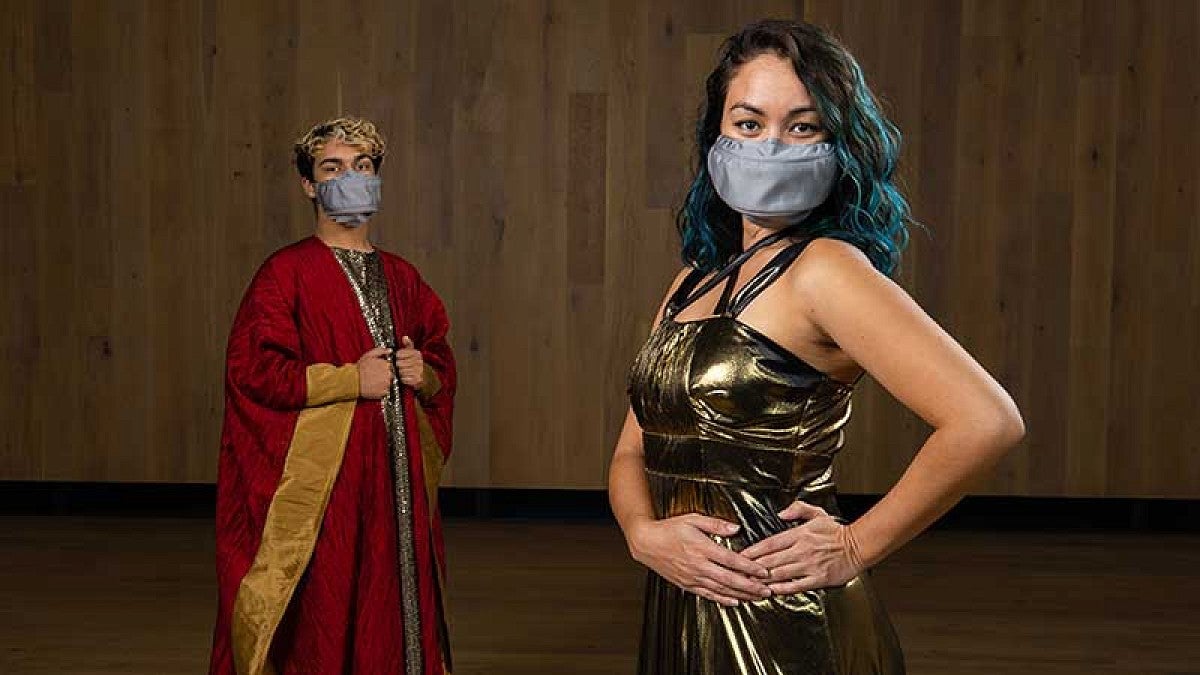When University of Oregon Opera Ensemble director Karen Esquivel needed advice on how to make face masks that could keep her students safe from COVID-19, she knew exactly who to turn to: Connie Kulick, vice chair of the advancement council at the School of Music and Dance.
An opera lover, Kulick had sewn many of the costumes for the ensemble’s epic, three-hour version of the French opera “The Tales of Hoffman,” which was performed at Beall Hall in February 2019. She’d also spent more than 30 years as an emergency room nurse at Level 1 and 2 trauma centers in California, Oregon and Washington — as well as a stint on the hospital ship USS Repose during the Vietnam War — before retiring from PeaceHealth Sacred Heart Medical Center at Riverbend in 2014.
“I gave her a call and I said, ‘Connie, I need some help,’” Esquivel said. “She was like, ‘Let’s do this!’”
Together, they reviewed research in journal articles with titles like “Aerosol Filtration Efficiency of Common Fabrics Used in Respiratory Cloth Masks.” They settled on 800-thread-count cotton as the ideal material and decided to use a double-layered construction to add an extra level of protection.
“The fact that she’s a retired registered nurse really helped because she was focused on keeping it safe, and she was willing to look at all the science and data,” Esquivel said.
They scoured online forums for mask patterns designed to give classically trained singers the space to breathe and open their mouths wide while maintaining a tight seal.
“When I worked in the ER, we actually had to fit each N95 mask individually, so I knew that we needed to get a good fit,” Kulick said. “We wanted to make them the best that we could possibly make them.”
Then Kulick got to work sewing a prototype. The result, made with UO yellow cloth, looked a lot like a duck bill, a fact that wasn’t lost on students, who quickly started calling it “the duck mask.”
Next stop was a local store, where Kulick bought a king-size sheet in a more discreet shade of gray that wouldn’t clash with student outfits. She took it to local seamstress Etain Wilday, who has made costumes for the Eugene Ballet and Eugene Opera, and asked her to turn it into two masks for every student in the opera program.
“We tried to source this locally,” Kulick said. “That was very important to me, and it was important to Karen too, because the arts community is not performing, they’re not making costumes, they’re not in production, so they’re really suffering economically as well.”
Kulick covered all the costs and gave the masks to students for free. Manufacturing locally allowed them to keep expenses low, without sacrificing quality. The price tag ended up at around $14 per mask, compared with more than $30 apiece that similar masks were selling for online.
“We were able to save a tremendous amount,” Kulick said.
She drew on her experience as an ER nurse to individualize each mask, using colored beads on the cording as a unique identifier for each one.
“I wanted the students to be able to know just by looking that this color – blue, pink, purple – this one’s mine,” she said. “You don’t want people mixing masks.”
The final product, which uses zip ties sewn into the seams to keep the material away from the nose and mouth, is more comfortable for singers than using a face shield, and has the added benefit of reducing aerosols, Esquivel said.
“The mask gives you room to articulate, to move your mouth,” she said. “I tried singing with a face shield at home and I gave myself a headache. The sound just bounces back.”
Esquivel said the masks made her feel more confident about resuming in-person, individual lessons with opera students for fall term, along with the other safety protocols in place at the School of Music and Dance, including 12-foot physical distancing, 30-minute rest periods between room uses and enhanced cleaning protocols.
“Duck masks” have proved so popular that Kulick has already ordered 100 more for the UO Chamber Choir and choral music faculty, and she’s recruited a group of donors to share costs with the school.
As for Kulick, like any decent ER nurse, she said she enjoyed rolling up her sleeves and helping people stay healthy.
“There was a need,” she said. “It was a way of meeting a need.”
Kulick — who along with her husband, Tom, a 1970 political science graduate, has given an annual scholarship to a student in the UO Opera Ensemble for the last six years — said her latest collaboration with Esquivel led to an even deeper connection with the program.
“This has been a very rewarding relationship,” Kulick said.
And she couldn’t help giving students a final word of advice, from the voice of experience: “Just wear a mask.”
—By Steve Fyffe, School of Music and Dance


